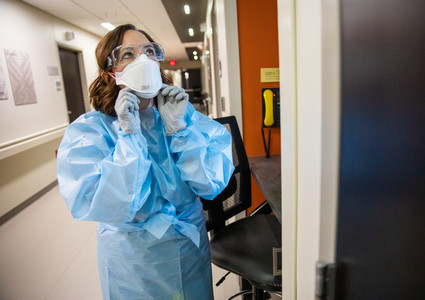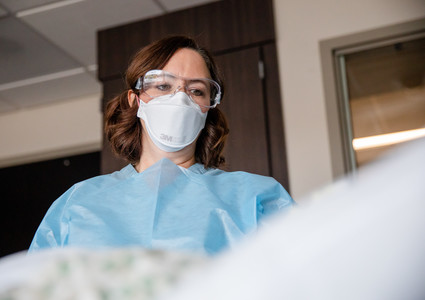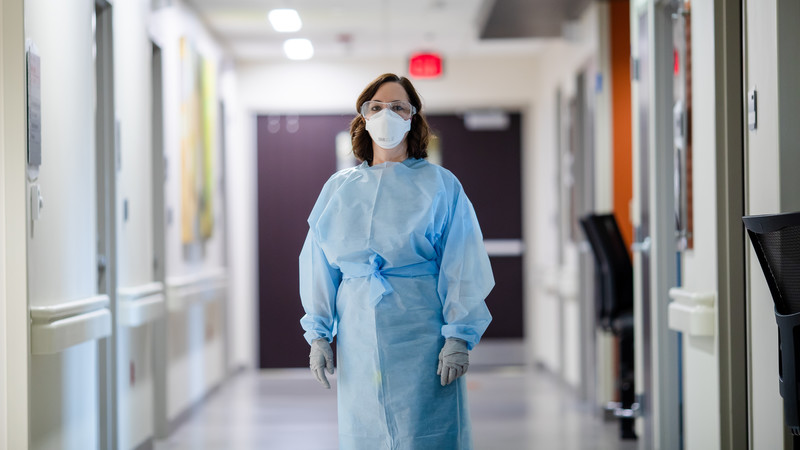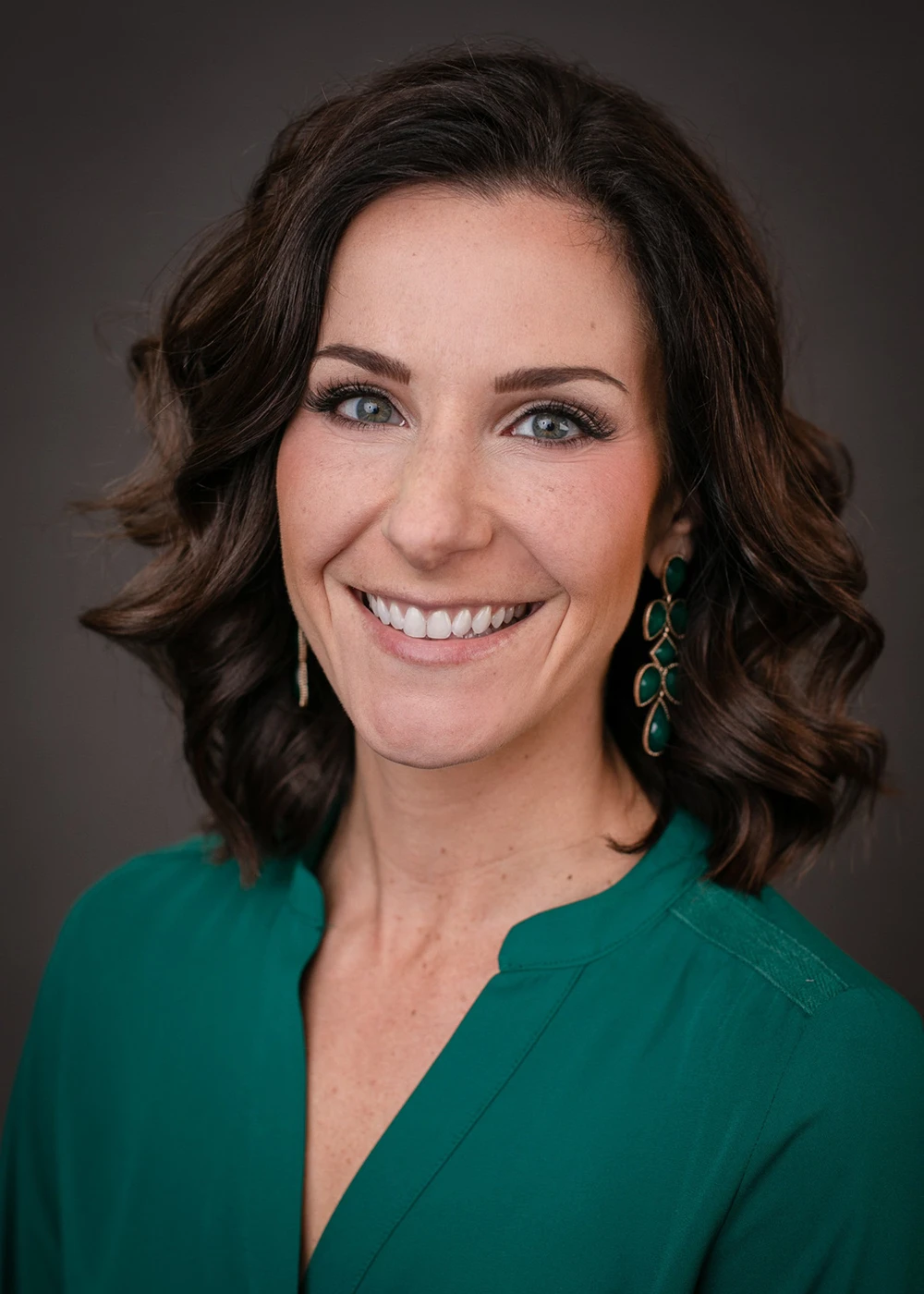The Meaning of Care Magazine
Necessary Handiwork: A Day in the Life of a COVID-19 Warrior
Published: Nov. 24, 2020The pulmonology and critical care nurse practitioner looked up from her desk at Methodist Fremont Health. Her eyes widened. Her jaw dropped.
Based off improving lab results, she realized that the last remaining patient of a COVID-positive cohort – employees of a nearby meat processing plant who were hospitalized in May – was going to survive. Many of those before him had passed. The young man, who had spent weeks on a ventilator, no longer showed signs of multiple-organ failure.
“It was a kernel of hope,” Pioppi said as her voice gave out and tears began to fall. “It was the realization that maybe we don’t have to call somebody’s family in the middle of the night to let them know their loved one isn’t going to make it. It was the recognition that staff is going to see that weeks of caring for this man are actually going to result in something good – other than a good death. This man was going to see his family again.”
And when the patient was discharged, his care team lined the hallways with tears in their eyes. They clapped, cheered and wished him well. Pioppi looked around at her fellow warriors and realized it was the work of their hands – working together – that made this moment possible.
Career Over Family
Pioppi, who started playing piano at age 5 and was fairly fluent in Spanish by the time she graduated high school, carries a lot of talent in her hands and voice. For years, she knew she wanted to pursue a “helping profession,” but she never imagined that her God-given talents would one day help save lives.
On Sunday, May 17, 2020 – her 50th birthday – Pioppi got the call. COVID-19 had officially made its way to Fremont. The hospital was quickly filling with patients – the majority of them, Latino.
“That Monday I called my husband from work and said, ‘I think you need to move me to the basement.’”
Having seen firsthand the gravity of this illness, Pioppi, for the first time in her life, was suddenly committed to putting her career before her family.
“I had to,” she said. “There aren’t many of us who do this type of work. And probably fewer of us who speak Spanish, right? My family was safe. Inconvenienced? Scared? Yes, just like everyone else. But they were safe. These patients were not.”
So, Pioppi slept in the basement at home. She used a separate bathroom. She saw her husband, son and daughter for an occasional family dinner as she stood at the kitchen counter, watching them eat in the dining room.
“All the steps I took to avoid bringing it home to my family – probably above and beyond crazy,” she said. “I just didn’t know – nobody really knew – what it was that we were dealing with.”
Training, Mentoring, Leading the Charge
In an effort to assist and mentor a young overnight nursing staff, Pioppi began working 10 p.m. to 6 a.m. starting in June.
“These critical care nurses hadn’t yet seen this level of acuity,” she said. “It was really important to me that they never felt alone.”
Working alongside these nurses tipped her off to the ones who needed extra support, as it became apparent she wasn’t alone in feeling the mental, emotional and physical exhaustion of each shift.
“Being up in the middle of the night and constantly dealing with crisis. You know, trying to help a person have a good death at 2 a.m. – that’s hard. So, I tried to be someone to lean on – a smile in so much despair.”
It also gave her a unique vantage point for new and unfamiliar issues as they unfolded.
“For example, when it came to proning patients – or moving them from their backs to their stomachs in an effort to oxygenate them better. I’d see that a patient’s eyes were open. Well, you can’t have your eyes open for 16 hours and not suffer some kind of corneal scratch or abrasion. Same with patients who were developing pressure ulcers on their faces. Could we put their heads in a donut – like you see on a massage table? Could we turn their heads and protect their skin with special material?”
She spent days researching, collaborating and writing a 30-minute COVID-19 nursing care module for the entire critical care staff. Proning was a small piece of it.
“I pulled from many resources. But that experience of actually being in the room provided some of the best information about the problems we needed to solve.”
With Hands and Voice

equipment.
“Being in the room” required a lot of Pioppi’s time and energy. The repeated motion of putting on and taking off personal protective equipment was no quick task. But the gowns, gloves and incessant handwashing were only part of her care routine.
“It was important that I laid my hands on every single patient, every single shift. I can’t make great decisions without a good physical exam. But also, think about it: If someone is sick at home, you hug them, you touch them, you cover them with a blanket. These patients don’t get the luxury of that loved one’s touch. And in the midst of all the machines, I never wanted to lose sight of the fact that this was someone’s husband, father or son.

each patient.
So, I touched them. I stroked their back and told them, ‘Yo estoy aquí’ – ‘I am here,’ in Spanish. In case they might have heard me. In case they might have felt me.”
Not a certified interpreter, Pioppi asked for help when important decisions needed to be made or when families needed to be notified of their loved one’s passing. But to be able to communicate with patients whenever it was an option made all the difference in the care she and her team provided.
“Just to be able to ask them: ‘How is your breathing? Is your chest hurting? What are your concerns?’ It saved us all time, which we didn’t have a lot of.”
A Team of Warriors
Much like a hero, Pioppi continuously saw needs and jumped into battle. But if you ask her, “There’s nothing heroic about what I did.”

The term “warrior,” however, she concedes to. Because she’s ready and willing to continue a fight she believes is far from over. And some of the best warriors, she said, don’t act alone.
“We lost a lot of patients – just like the rest of the nation. But many of our outcomes were excellent – like that young man who had every odd against him. Outcomes like his just don’t happen without everyone in tandem rising to the occasion and working a level up without being asked.”
It’s that kind of teamwork, she said – that necessary handiwork – that embodies The Meaning of Care.
“At the end of the day, I don’t think any of us wanted to return home thinking we could have done more because we were distracted, preoccupied or scared. We had to run into this fire head on. And that’s what we did. Together. Holding hands.”
Photos and video by Daniel Johnson
More Resources
- Read about the CDC’s recommendations for safe holiday celebrations.
- Learn the difference between a cold, the flu and COVID-19.
- Get similar articles delivered straight to your inbox.


